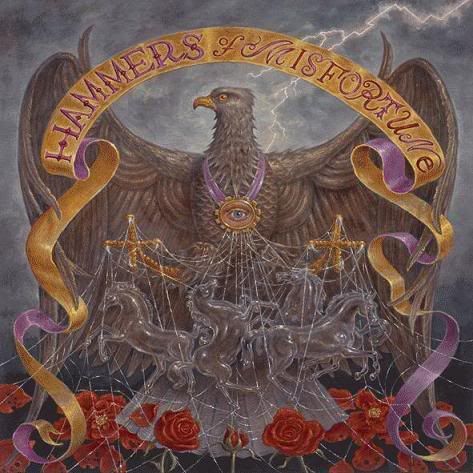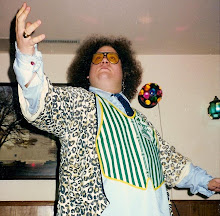Gifted with endless war
 Hammers of Misfortune
Hammers of MisfortuneThe Locust Years
(Cruz del Sur, 2006)
Being seriously at a loss for what to review today, I decided to throw some praise at one of last year's finest recordings. If you know me, I've probably raved about this band to you at some point. Hammers of Misfortune is the offspring of songwriter and guitarist John Cobbett, a Bay Area metal gadabout who has composed music for "The Sims" and other video games. A very early (pre-recording) member of GWAR, Cobbett also plays in Ludicra, Alternative Tentacles' token black metal act, and until a couple of years ago he was Mike Scalzi's co-guitarist in Slough Feg. In turn, Scalzi was a member of Hammers until after The Locust Years was recorded. Now each guy works on his own band, with Hammers also having lost bassist/vocalist Jamie Myers and longtime drummer Chewy Marzolo since the album. This leaves Cobbett and keyboardist/vocalist Sigrid Sheie, who have assembled a new lineup for local shows and Friday's SXSW showcase. (If anyone reading is in Austin this weekend, please get your ass to Emo's and let me know how they are.)
So, the album. It clocks in at a modest 45 minutes, yet like the previous two Hammers discs, The Locust Years is a concept album. It's not a "rock opera" with the singers playing different characters as on The Bastard, but the concept's not as mysterious and open to interpretation as that on The August Engine. This one is obviously about the current Bush administration, its philosophies and actions, the homefront response and the global repercussions. There are no characters, although many of Cobbett's beautiful lyrics here use the pronouns "we" and "our" and two of the eight song titles feature the word "widow." Musically, you have a very idiosyncratic mix of classic heavy metal, progressive rock, doom metal and folk, in that order. I call it idiosyncratic because Cobbett's got a way of making his music sound very grandiose from basic elements. When I interviewed Cobbett back in 2004, I told him that the songwriting was what truly stood out when I first heard his band. It's complex but accessible, with plenty to explore and enough addictive hooks to keep you going back for years. He told me that the people he considers great songwriters are of the Cole Porter/Stephen Sondheim variety, and on The Locust Years even more than in the past, you can hear the influence of simple refrains, theatrical flourishes and complex language. This is the first Hammers disc with a keyboardist, although Sheie toured with the band to promote Engine and they rearranged the earlier material to include her contributions. Sheie's acoustic and electric piano and Hammond B3 organ fill up the space between Cobbett and Scalzi's sharp but melodious guitars - that space which is already dominated by Myers, Scalzi and Sheie's voices, sometimes harmonized, sometimes intertwining with complimentary melodies.
The two most directly anti-Bush tracks are the instant classics. "The Locust Years" leads the charge with a succession of baronial guitar harmonies before launching into a rollicking endtime statement by a malicious aggregate of madmen. Scalzi and Myers harmonize the tongue-twisting verses, while Scalzi's inimitable voice bellows the chorus ("Now that we're unchained/We'll reign, insane/And drown the world in flames/And blood, and pain...") in a sarcastically sing-song melody. "Trot Out the Dead" is shorter and even catchier, a venomous condemnation of the way certain folks justify certain actions by bringing up certain national tragedies. Most heartbreakingly righteous is Myers' verse, delivered only with piano: "If the people wonder why so many had to die/Or they test the wisdom of your prevailing lie/And how you let it happen when you knew it all the time/And you just let them fly/It's in your evil eyes/The way they were betrayed the day they died/Trot out the dead." Closing things, "Widow's Wall" finds the ladies intoning tenderly and tragically over a piano, then a slowly building band, the ensemble finally launching into an energetic gallop dappled with curiously bright riffs. The rest of the songs are more linear, at times repetitive like a mantra. This was at first a disappointment considering the wildly varying material on their previous discs, but over time I came to enjoy the compact mood of each song. From the doom surge that intrudes upon "Famine's Lamp" to Sheie's dizzying acid rock organ doodling on the upbeat instrumental "Election Day," each has its own highlights. I urge everyone on the planet to hunt down The August Engine, for it is a genuine masterpiece and unlike anything you've ever heard. About a week later, once you've come up for air and remembered that other albums do exist, you'll want The Locust Years.
TODAY'S BONUS REVIEW: The new live CD/DVD package by Newfoundland folk rockers Great Big Sea. I am shocked that I'd never heard of these guys until recently. If they'd can their generic pop songs, I might absolutely love them.



1 Comments:
Great Big Sea, Courage & Patience & Grit (Zoë) ***
Celtic music has crept into many cultures around the world, but one of the most idiosyncratic blends can be found on the island of Newfoundland. The traditional songs there combine Celtic, English and French heritage with the rural maritime tradition of housebound hoedowns known as kitchen parties.
Folk rock superstars Great Big Sea are perhaps Newfoundland's biggest musical export and cultural ambassadors. The band's performance on Courage, GBS' second live set, feels cordially intimate, although the roar that greets husky-voiced singer Alan Doyle's promise of "the biggest kitchen party anywhere in the world" reminds the listener that it's actually occurring in a sold-out Ontario theater.
This CD/DVD combo documents Great Big Sea's tour behind 2005's The Hard & the Easy, which found the veteran trio eschewing original songs for a full set of traditional Newfoundland songs. Thus, the first half of the concert is acoustic, drawing from Hard as well as the plethora of folk tunes the band's included over the years, while the second half has them plugging in and pulling out a few rock songs.
The traditional songs are primarily sea shanties with an Irish sheen added by fiddle, tin whistle, bodhrán, accordion and bouzouki. From balls-out to balladry, these are uniformly good. Toe-tapping highlights include "Jack Hinks" and the amusing horse funeral tale "Concerning Charlie Horse." Séan McCann chips in to sing chipper tunes such as "Scolding Wife," "Old Polina" and "The Mermaid," one of GBS' curiously few ribald rhymes (these are sailor's songs, after all).
The second half has its share of jaunty sing-alongs, but the appearance of rock instrumentation saps some of the set's charm. While tunes like "Shines Right Through Me" and "Consequence Free" are amiable for jangle-pop, they sound very standard next to the folk songs. The ever-faster show-stopper "Merri-Mac" and even the a cappella harmonies of "Excursion Around the Bay" just have more energy.
The accompanying DVD is a pro-shot version of the same show, but with four extra songs, four music videos and visual evidence of the modest spectacle Great Big Sea creates in a live setting. When they focus on the winsome folk stuff - which is often here - it's simply impossible to dislike these Canadian Celts.
Post a Comment
<< Home